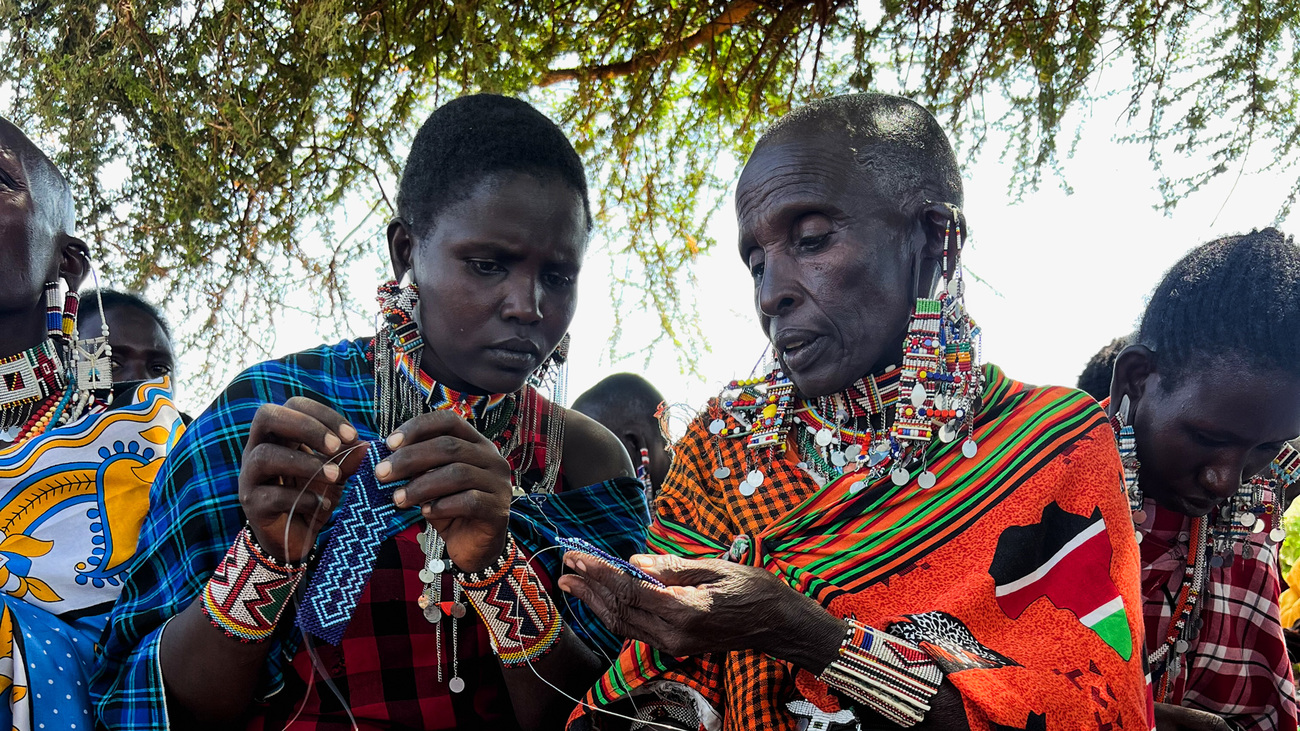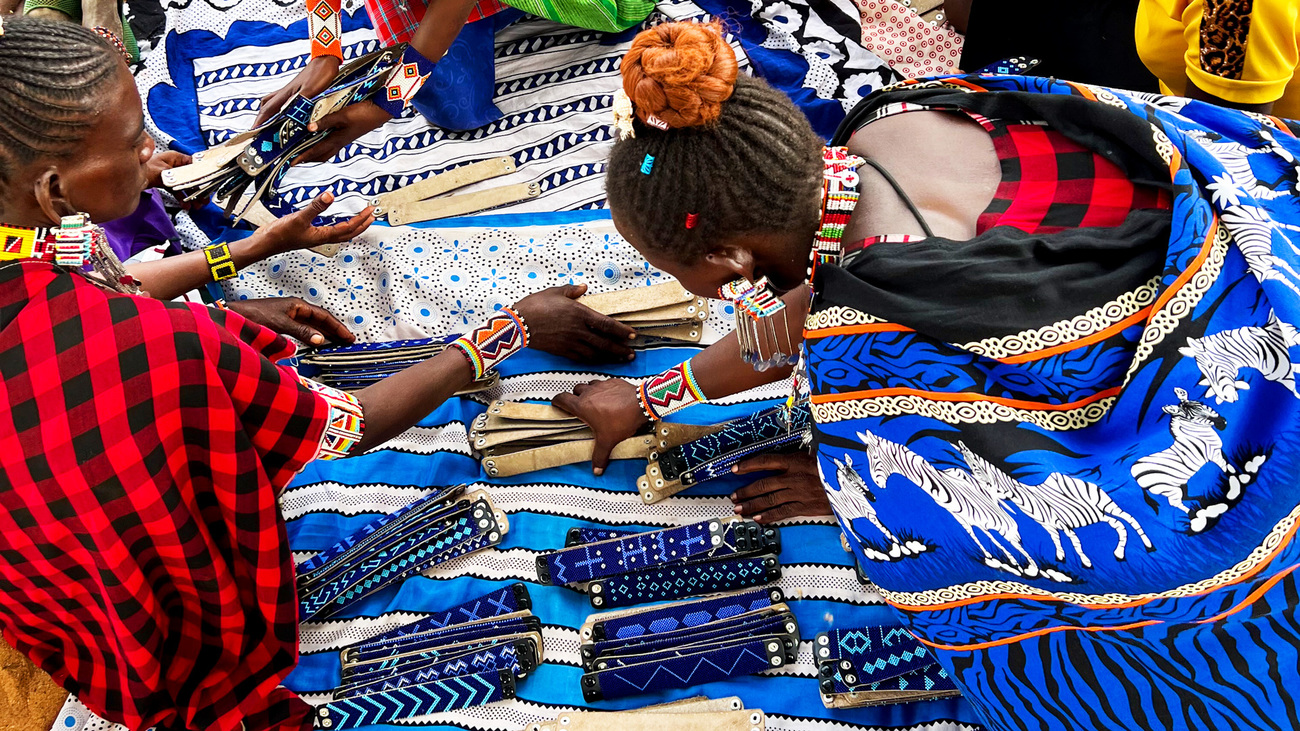Inua Kijiji: Uplift a village
Empowering women in Kenya with sustainable livelihoodsMaasai women embrace entrepreneurship to protect precious habitats
Maasai women embrace entrepreneurship to protect precious habitats
by Daisy Ochiel, IFAW Gender & Youth Officer
In southern Kenya, 270 Maasai women from the communities adjacent to Illaingarunyoni Conservancy, Kajiado County, are beading their way to entrepreneurship. Thanks to a vibrant partnership with David Rio, America’s premier chai brand, the indigenous women from three villages to the northwest of Amboseli National Park recently crafted 1,000 handmade bracelets for a US-based market. In addition to making many of these women first-time entrepreneurs, beadmaking provides an alternative means of income for a rural setting, where women often lack other livelihood opportunities.

Since the launch of the Inua Kijiji project in 2021, IFAW has invested in women empowerment initiatives that safeguard the future of wildlife by supporting sustainable, nature-friendly livelihoods. According to the UN, women represent over 60% of the 74% of Kenyans living in rural areas, where poverty levels remain high.
The devastating impacts of climate change are not gender-neutral—in fact, they exploit and further exacerbate existing gender inequalities. With limited economic empowerment opportunities available, Inua Kijiji equips this vulnerable constituency of people with skills and training to launch sustainable businesses and break away from generational cycles of poverty.
In mid-2024, buoyed by its success in Kitirua Conservancy, the project expanded its wings into Illaingarunyoni Conservancy—a critical wildlife dispersal area and the last remaining natural corridor that allows for free movement of wildlife between Amboseli and the greater Mara–Loita ecosystems.
Here, IFAW’s youth and gender officer, Daisy Ochiel, embarked on an ambitious recruitment drive to get 270 indigenous women together to take on a beading challenge: handmake 1,000 bracelets for David Rio. Susan Mengati is one of the Maasai women from three villages involved in the project’s expansion—Olgulului, Mashenani, and Lolakir . As a widow supporting eight children, she knows firsthand that economic opportunities for rural women are scarce.
Empowering women and preserving culture

Beading is not a novel skill for Maasai women, it’s a trade they’ve been practicing for millennia. But despite their skills, many women have only been able to sell their products in local markets. Here, most buyers aren’t too concerned about the finer details of each pattern and bracelet. However, to access and thrive in foreign markets, there was a clear need for each product to be standardised and refined to meet the global market needs and strict quality control thresholds. IFAW facilitated technical workshops with beading experts to upskill the women on crafting world-class products that can compete on the global stage.
Among the Maasai people, beadwork is a traditional craft symbolic of beauty, culture, identity, heritage, and even social class. The patterns and colours in each piece are inspired by the natural beauty of Kenya’s landscapes. The bracelets are representative of the distinct Maasai identity that has been passed down for generations.
For Susan, beading is more than preserving her tribal identity. She is now able to achieve what she previously struggled to do—paying school fees for her children. ‘Selling beads has empowered us beyond our imagination,’ she says.
Sustainable livelihoods benefit people and wildlife
We can only effectively protect our natural landscapes and give wildlife more space to roam when the needs of people are met. The Inua Kijiji project has so far transformed the lives of over 400 women—especially mothers, widows, and young girls who live in remote and geographically disadvantaged areas of Kajiado County.
Through Inua Kijiji, IFAW is actively uplifting rural Kenyan women through entrepreneurship while benefitting wildlife species like elephants by allowing them to roam in the same landscape that sustains the Maasai’s nomadic lifestyle. The Mashenani, Lolakir, and Olgulului villages are adjacent to Illaingarunyoni Conservancy, where the Maasai community committed to leasing over 29,000 acres of community land to conservation to give wildlife more room to roam.
IFAW is committed to working with communities to support sustainable livelihoods that reduce their reliance on natural resources, especially in regions most impacted by climate change and biodiversity loss. Engaging communities living closest to wildlife is imperative for our vision of animals and people thriving together.
Related content
Every problem has a solution, every solution needs support.
The problems we face are urgent, complicated, and resistant to change. Real solutions demand creativity, hard work, and involvement from people like you.